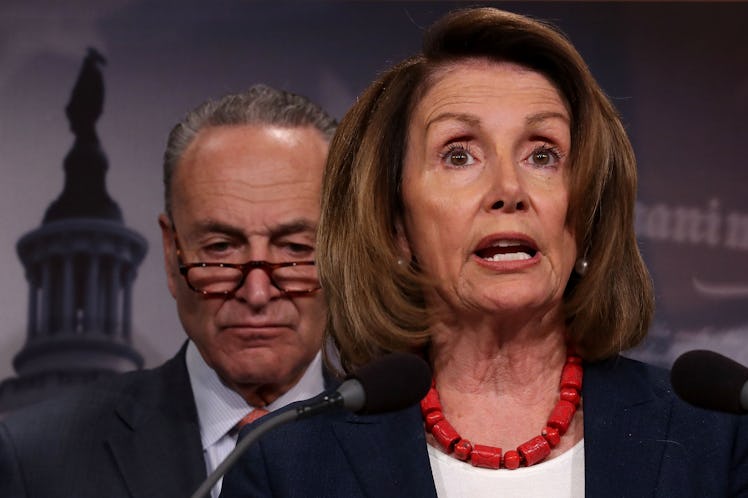
Even Democrats Aren't Trying Too Hard To Push For Gun Control After Las Vegas Shooting
After a gunman's attack on a crowd of concertgoers in Las Vegas, Nevada resulted in 59 deaths and over 500 people injured, a number of notable politicians made public statements regarding gun policy. Among those politicians were former Secretary of State Hillary Clinton, Senator Bernie Sanders (D-VT), and Senator Chris Murphy (D-CT), an early prospect for the 2020 Democratic nomination for president. But when it comes to whether Democrats will actually make a push for major new laws — and the general question of what Congress is doing about gun control — it's looking like not much will happen.
Yes, Democrats have talked about Congress taking action, like on Monday, Oct. 2, when Rep. Linda Sanchez (D-CA) said at a press conference, according to the Washington Examiner,
We need to do more to make the indiscriminate killing of human beings less easy, if that makes sense. Perhaps not a very poetic way of saying it. Until Congress makes it harder for dangerous people to acquire assault weapons, large magazine rounds, tragedies like this unfortunately are going to continue to happen. We need to have that discussion on gun safety.
But as the Washington Examiner's Pete Kasperowicz mentioned, most Democrats have been stopping shy of making a verbatim endorsement of "gun control." Even Sen. Murphy's aggressive message to Congress — that it "get off its ass and do something" — didn't specifically mention gun control, Kasperowicz noted.
Democrats' avoidance of the term "gun control" has been the subject of a number of reports this week that assert how unlikely it is that the minority party in Congress will push for major gun control laws.
One of those reports came from Politico, which pointed out that some Democrats have found that making gun control policy a key part of their agenda -- particularly with an election year coming up -- would not mobilize voters.
Politico quoted House Minority Whip Steny Hoyer (D-MD) as saying,
It doesn’t seem to make a great difference at the ballot box, and that’s frustrating.
Meanwhile, Rep. Sanchez said, per Politico, that the party's platform will continue to focus on an economic message.
Sanchez said,
First and foremost, it’s an economic agenda. While for some members gun violence will be a platform that they will talk a lot about, we want to emphasize the fact that Democrats have and always will continue to stand with working families.
Electoral realities has, in fact, been a common among reports about Democrats' strategy on gun policy going forward. The National Journal's Josh Kraushaar's noted that among the six Democratic senators who are from states that voted Republican in the 2016 presidential election and are up for re-election in 2018, none of them made public statements calling for gun control.
Even Rep. Jacky Rosen (D-NV), the House member who represents the district where Las Vegas is located, hasn't made any aggressive calls for more gun control.
A spokeswoman for Rep. Rosen told the National Journal,
No single policy change could prevent a mass shooting like this, but Congresswoman Rosen is committed to action that addresses the unacceptable rate of gun violence in this country and will help ensure fewer weapons designed to kill people end up in the hands of dangerous individuals
All in all, Democrats' lack of power in Congress — among other factors — appears to have tamed their rhetoric on gun policy.
But there does seem to be one area in which they could work with Republicans on the issue. The idea of banning "bump stocks," a device which enables rifles to fire more rapidly, has been floated as a possibility for Congress.
But when it comes to calls for major gun control legislation, it doesn't look like that will happen any time soon.
If you would like to ask your representative in Congress to take action on gun control, you can call the Capitol switchboard at (202)-224-3121. Just be sure to not contact a representative for a state other than your own.